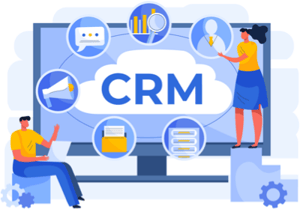B2B Sales Leadership and CRM
April 25, 2023

What role should sales leadership play in their organisation’s deployment of CRM?
 A CRM application lies at the centre of the technology stack of most sales organisations. It often represents one of the most significant investments made to support sales effectiveness. And yet both organisations and users often express frustration with both the user experience and the quality of the information and insights that are generated.
A CRM application lies at the centre of the technology stack of most sales organisations. It often represents one of the most significant investments made to support sales effectiveness. And yet both organisations and users often express frustration with both the user experience and the quality of the information and insights that are generated.
Clearly, some CRM platforms are better for a particular purpose than others. Clearly, some are (a lot) more cost effective than others, Obviously, some implementations are far more successful than others. But when you really dig in, many of the issues with CRM are not related to which technology has been chosen, but to the role sales leadership plays in creating the right environment.
To put it bluntly, no CRM implementation can come anywhere near reaching its potential unless the sales leadership of the organisation is actively and visibly committed to its success. And that process starts with establishing the right framework and setting the right expectations in the first place...
There are few things more likely to turn salespeople off a CRM system than being asked to enter a load of detailed information much of which seems irrelevant to them and which - even worse for the credibility of the system - never seems to be analysed or acted upon by management. The information just seems to the salesperson to flow into a black hole, never to escape.
Focusing on what’s really valuable
 So perhaps the first lesson for sales leadership is to ensure that the CRM focuses on the truly valuable - on collecting, capturing, analysing, and presenting actionable information to both salespeople and managers and avoiding making anyone’s use of the system any more onerous or complicated than it needs to be.
So perhaps the first lesson for sales leadership is to ensure that the CRM focuses on the truly valuable - on collecting, capturing, analysing, and presenting actionable information to both salespeople and managers and avoiding making anyone’s use of the system any more onerous or complicated than it needs to be.
All too often, I’ve seen CRM implementations that seem to have been designed in a vacuum by a committee to capture anything that could possibly ever be of interest to any of the interested parties without regard to the complexities created for the users or, indeed, how the information would actually be applied.
Rather than attempting to mandate the collection of every possible piece of information, the most effective CRM implementations focus on what’s really important to both the user and leadership, and on making it as easy as possible for that information to be captured, analysed and acted upon in a timely fashion.
Stimulating salespeople to think
Effective CRM systems stimulate salespeople to stop and think about what they are doing rather than just collecting data. They cause salespeople to ask themselves questions that a good manager would ask if they were having a conversation about the opportunity.
They also help salespeople to recognise what they do and don’t know about an opportunity, and where the gaps in their knowledge are. They require salespeople to demonstrate the evidence upon which their most important judgements about the opportunity are based, and to acknowledge where they are making assumptions that are not supported by the facts.
My favourite example involves close dates. Every CRM system I’ve ever come across requires that salespeople enter a close date before they can create an opportunity - despite the fact that these close dates are often at best speculative, particularly when it comes to complex discretionary purchases.
I always recommend that my clients add an additional mandatory CRM field that requires salespeople to acknowledge the basis of the currently projected close date:
- Is it the date by which the customer MUST place an order, based on a verified compelling event, with no likelihood of slippage?
- Or is it the date by which the customer WANTS to place an order, evidenced through conversation, but where either the customer or the salesperson acknowledges that that date could slip?
- Or (as is most common) is it the date by which the salesperson HOPES to receive an order, without any verification that this is also the customer’s intention?
These three statuses have very different implications for our confidence in the currently-entered close date - and when accurately recorded, also act as a catalyst for both honest self-reflection on the part of the salesperson and a coaching opportunity for the manager.
Eliminating tick-box behaviour
The problem with requiring too many mandatory fields - and particularly when those fields need to be completed before an opportunity can be advanced to the next stage in the pipeline - is that if they are not supported by the appropriate management behaviour, they can result in thoughtless, “tick-the-box and get it over with” activity.
This - unfortunately, but all-too-frequently - completely negates the purpose of identifying certain information as mandatory and makes the entered data less accurate rather than more useful. Leadership needs to ensure that salespeople see the value to themselves in accurately completing the required fields, so that they give the appropriate amount of thought to completing them.
In most cases, organisations that are engaged to complex sales environments get better outcomes from flagging incomplete fields for management attention rather than requiring that those fields are completed without management inspection as a condition of moving an opportunity to the next stage.
The 3-times coverage myth
Another key area where thoughtless process can make CRM less effective lies in analysing pipeline coverage. There’s a long-standing rule-of-thumb that all pipelines with more than 3 times coverage are good, whereas all pipelines with less than 3 times coverage are weak. There is no empirical evidence whatsoever for this simplification.
On the other hand, there is widespread evidence that top-performing salespeople have a much higher win rate than their less-effective colleagues. They qualify harder (and therefore disqualify bad opportunities earlier) and execute better (and therefore close more qualified opportunities, faster). Applying a naïve 3-times-coverage analysis leads to completely the wrong conclusions.
The myth also ignores that fact that different types of opportunity have vastly different win rates. We typically need a much higher value of net new business opportunities than existing customer upsells to achieve the same revenue target. Pipeline coverage analysis must take these factors into account.
The opportunity review process
I’ve always believed in the principle - if we want to ensure that our CRM system is being actively used - that we need to insist that any discussion about the status of an opportunity needs to be based on the expectation that the required basic information in CRM is up-to-date prior to the review.
The review process gives sales leadership the chance to add tremendous value - but not if it’s a simple routine of just reviewing the current value, close date, stage, probability, and next steps that are reported in CRM. Instead, sales managers need to use the exercise to test whether the salesperson’s thinking is sound, to uncover unverified assumptions and to insist on seeing the underlying evidence.
Summarising the sales leader’s role
Sales leaders are ultimately responsible for their organisation’s effective use of CRM - but simply mandating which fields must be entered by when is an abdication of that responsibility. Through their words, behaviours and actions, sales leaders must demonstrate that they care deeply about the quality of thought that underpins the data.
This article was first published in the latest edition of the International Journal of Sales Transformation.
About the Author
 Bob Apollo is a Fellow of the Association of Professional Sales, a founding contributor to the International Journal of Sales Transformation, a recognised Sales Futurist, and the driving force behind Inflexion-Point Strategy Partners, the leading proponents of outcome-centric selling.
Bob Apollo is a Fellow of the Association of Professional Sales, a founding contributor to the International Journal of Sales Transformation, a recognised Sales Futurist, and the driving force behind Inflexion-Point Strategy Partners, the leading proponents of outcome-centric selling.
Following a successful corporate career spanning start-ups, scale-ups and market leaders, Bob now works as a strategic advisor, mentor, trainer and coach to ambitious B2B sales organisations - teaching them how to differentiate themselves through their provably superior approach to achieving their customer's desired outcomes.


Comments